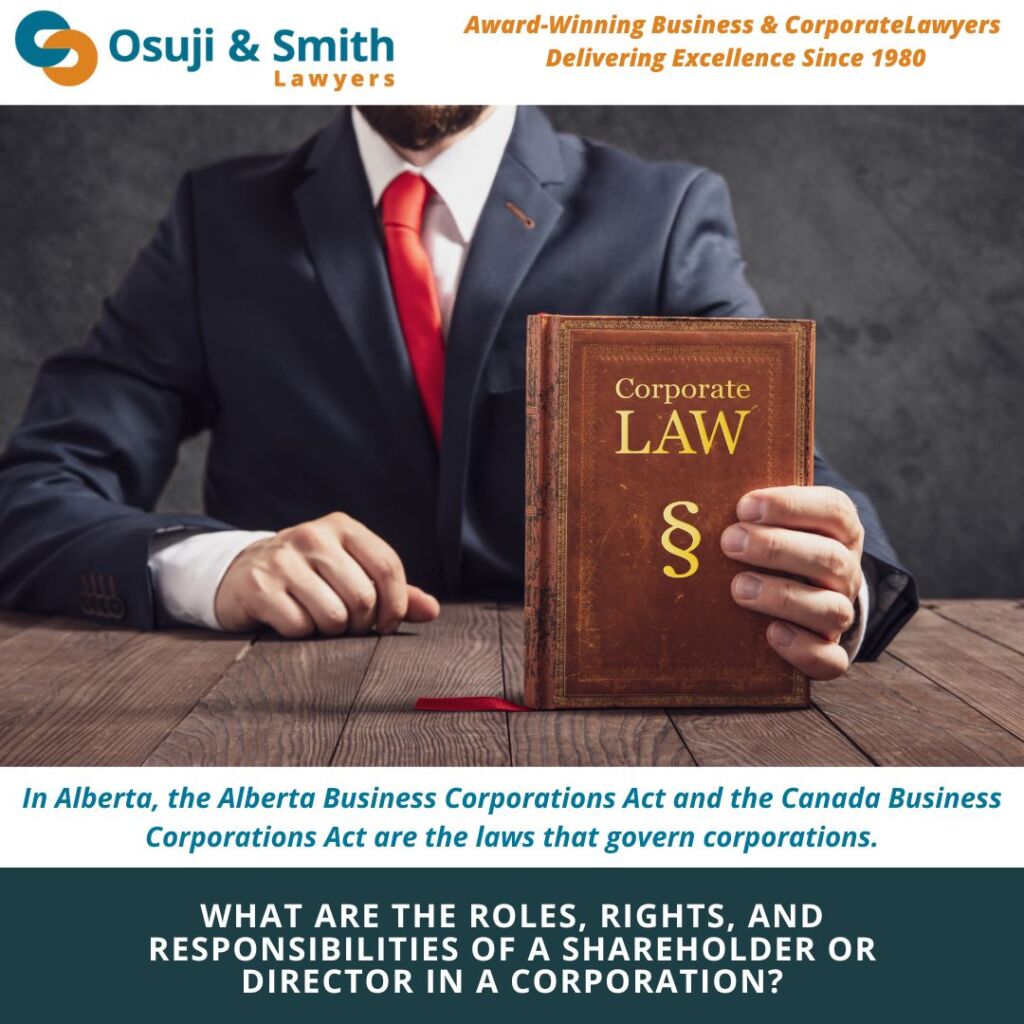What are the roles, rights, and responsibilities of a shareholder or director in a corporation?
In Alberta, the Alberta Business Corporations Act and the Canada Business Corporations Act are the laws that govern corporations. In this post, we’ll look at what these laws say about the roles, rights, and responsibilities of shareholders and directors of a corporation.
What are the different roles in a corporation?
There are three main roles in a corporation. They are:
- Shareholder: Someone who has purchased shares in the corporation, making them an owner
- Director: Corporations are required to have at least one director—someone who directs the course of business for the company. A director is elected by the shareholders.
- Officer: Essentially an employee, hired to manage the day-to-day business operations. The CEO is typically chosen by and reports to the board of directors, and the other officers report to the CEO.
A person can fill more than one role at the same time. For example, a shareholder can also be a director and an officer.
What are the rights and responsibilities of shareholders?

A shareholder is an owner of the corporation because they have purchased shares or invested in the company, either by purchasing directly from the treasury or by purchasing shares from an existing shareholder.
Shareholders can receive dividends (a share of the company’s profits), and upon dissolving the business, can receive assets of the company. Shareholders also have the following rights and responsibilities:
- Be notified about and attend shareholders’ meetings
- Vote at shareholders’ meetings
- Elect and dismiss directors
- Approve by-laws and any major or fundamental changes to the corporation’s structure or business activities
- Appoint an auditor or waive an audit requirement
- Examine and copy corporate records, financial statements, and directors’ reports
- Receive the corporation’s financial statements at least 21 days prior to the annual meeting
A shareholder’s liability in the corporation is restricted to the value of the shares they purchased. They are not usually liable for the corporation’s debts.
What are the responsibilities of a director of a corporation?
A director of a corporation generally directs the course of business for the company. This includes assigning and training officers and management in the corporation—which affects the day-to-day business operations—and establishing business goals and policies.
In addition to acting as the “operating mind” of the corporation, a director has two primary duties:
- To act in good faith and with the best interests of the corporation at the forefront, and
- To act with a duty of care, which is a duty to all stakeholders in the company and requires the director to exercise a level of care and diligence that any reasonable person might in similar circumstances in carrying out their functions.
Because of the broad scope of authority a director holds, and because of the degree of trust placed in them by the shareholders, the law holds directors responsible for staying informed about the corporation’s activities and ensuring that the corporation’s activities are legal and in the best interests of the corporation.
Corporations must have at least one director. Directors are individuals elected by the shareholders and must meet the following requirements:
- At least 18 years old
- Not declared incapable under provincial law or any court with jurisdiction outside Canada
- Not be in bankrupt status
Additionally, in most cases, at least 25% of the directors of a corporation must be resident Canadians. (When a corporation has fewer than four directors, at least one must be a resident Canadian.) However, corporations in certain sectors (such as book retailing, video or film distribution, airlines, or telecommunications) must have a majority of resident Canadian directors.
If an individual who is nominated as a director is present at the shareholders’ meeting, they consent to serve as director by default, unless they refuse. If the nominated individual is not present at the meeting, they must either consent to their election in writing within ten days of the election, or act as a director after the election.
The length of the director’s mandate—up to three years—can be set in the by-laws. When a director’s term expires, they can be re-elected. The by-laws can also restrict the number of terms an individual can be elected for. Directors’ terms also end upon their resignation, death, or disqualification or removal by the shareholders.
How can a director avoid liability for director duties and responsibilities?
If a director fails to fulfill their duties and responsibilities, or if a corporation breaches any duty or statutory provision, the directors can be personally liable. Ignorance of the corporation’s activities is not a permissible defence in an Alberta court of law, so a director is responsible for staying informed about the corporation’s activities and ensuring that the corporation’s activities are legal and in the best interests of the corporation.
In some cases, there may be a defence that enables a director to avoid liability. For example, the “business judgment” rule can be used if the director can defend a business decision with evidence that it served a valid business purpose and was reasonable in light of the information the director knew at the time. Another defence can be “due diligence”, which shows that the director actively attempted to prevent harm.
Corporate Lawyers for Shareholders & Directors in Alberta
The corporate lawyers at Osuji & Smith tailor our legal advice based on your unique business goals and priorities. It’s our job to help you make sound decisions for you and your business and to find strategic solutions to your shareholder and business disputes. We have years of corporate litigation experience at different levels of courts in Alberta. We can assist you with contract negotiations, corporate documentation, and any other business law concerns.

